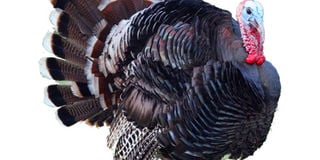Learning to rear turkeys the right way pays

What you need to know:
- A turkey is one of the most rewarding domestic bird fetching up to Shs100,000 during the festive season of December. The best time to keep turkeys for Christmas is now as they have tasty meat after 10 months. Turkeys are easy to raise, writes George Katongole.
- Apart from the health benefits, turkey rearing can be a great source of earnings. A turkey which is four months old costs between Shs30,000 and Shs50,000 while a mature one costs more than Shs100,000.
Rose Akol and her family have been perfecting the art of rearing turkeys for the past five years and she hopes to venture into commercial production soon.
Renown for chicken rearing in Ddumba Zone in Kakira, Jinja District, Akol specialises in farming free range meat turkeys. Two years ago, Akol was introduced to turkeys as an alternative poultry activity during a session on personal development as St Stephen’s Church.
The 44-year-old started with one hen (a female turkey) which she bought for Shs60,000.
It took her six months to welcome the nine eggs unfortunately when they hatched, all turkey poults died.
She sought expert knowledge and after three months the parent turkey laid nine eggs.
Best practices
Nutritionists recommend turkey meat as it is classified white meat and contains vitamin B, protein, phosphorous and choline.
Turkey meat also keeps insulin levels stable, strengthens the immune system and boosts the body’s defence against cancer.
Apart from the health benefits, turkey rearing can be a great source of earnings. A turkey which is four months old costs between Shs30,000 and Shs50,000 while a mature one costs more than Shs100,000.
However, before venturing in a commercial business, there are some fundamental considerations one must take into consideration.
Akol explains that turkeys are entirely free range as they like foraging in their natural habitat.
Currently, most poultry suppliers do not deal with turkeys so the best place to buy chicks is from fellow farmers. But this poses great challenges as the health of such birds is not well monitored.
Most of the requirements for raising baby turkeys are similar to other forms of poultry only that turkeys prefer a natural setting.
Akol explains that turkeys need enough space in the brooder as well as food, water and heat.
In the early days, she suggests that farmers should observe the feeding patterns as aggressive chicks can starve others.
Poults should not be let to roam before they are fully feathered, she says.
Providing adequate space of 1.25sq feet per bird in the first month which is increased to 2.5sq feet per bird until 16 weeks keeps birds healthy.
But she says that poults are vulnerable to diseases. A farmer should keep an eye on the turkey’s rear for any signs of diarrhoea or vent pasting, where poop sticks to their butts, can actually block passing poop.
She recommends that in the first four weeks, an outgrowth of a black feather on the wings should be removed.
Akol explains that turkeys are Newcastle disease carriers. But that is not the only major disease for poults as they also face coccidiosis, blackhead, and airsacculitis. These conditions normally require quarantining the birds, among other solutions.
Proper feeding
Akol advises against feeding poults on layer pellets, as the calcium level is too high for growing birds. But recommends protein-rich feeds for the first eight months.
Feeds should always be placed on a raised platform in an open space that can receive enough sunlight. Turkeys like feeding on grass and greens with a mixture of small stones which are good for their digestion.
Improved turkey varieties are ready for meat consumption after six months although it can take up to eight months for some varieties.
Hens can be taught to roost as early as four weeks. According to Akol, a farmer will demarcate space for roosting with beddings.
Akol says that timing the market is an important element. She says that the turkey season starts around October ahead of the Christmas festivities.
“The best prices are offered during Christmas and a farmer should have ready birds ready for sale by that time.”
Last Christmas, Akol sold 30 big turkeys each at Shs150,000 yet they would normally go for Shs100,000 if it were not the Christmas time.
She says that keeping down the cost of feed, labour and housing is important in reaping the benefits.
In her stock, she has 13 layers which she hopes to give her enough birds to sell during this year’s Christmas.
Challenges
Akol explains that turkeys have a high death rate primarily because of their wild instincts of laying in bushes and aggressive behaviour. They also lack mothering skills for their young ones.
According to Akol, this calls for added responsibilities from the farmer.




